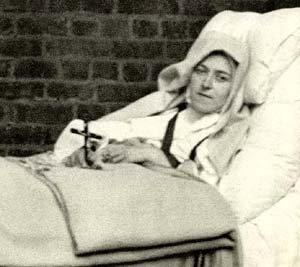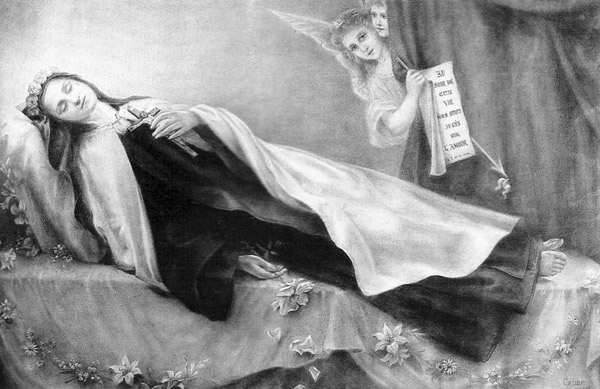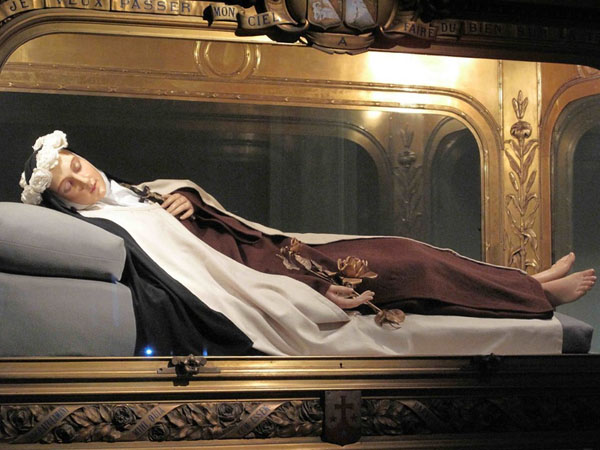 Blessed are they that mourn, for they shall be comforted (Matt. 5; 5).
Blessed are they that mourn, for they shall be comforted (Matt. 5; 5). Blessed are they that mourn, for they shall be comforted (Matt. 5; 5).
Blessed are they that mourn, for they shall be comforted (Matt. 5; 5).
My dear friends—you who love the Little Flower, who are devoted to her and wish to honor her—you also wish to obtain more favors from her. You have heard that she prophesied and promised that she would spend her heaven doing good upon earth; that she would obtain from Our Lord and let fall upon earth a shower of roses, and one or many of these roses you hope to obtain. There is one rose in particular which you can all be sure of obtaining from her for the mere asking, a rose which we all need, but a rose which, if not warned, many may forget to ask from her. I intend to advocate the cause of that particular rose which I say we need and ought to ask from the Little Flower, and which I know she will be particularly happy to let fall upon those who ask it of her. The rose of which I speak is a certain virtue for which the Little Flower herself was remarkable. Let us glance at her life and see what this rose of virtue is to which I refer.
But by way of a preliminary to an examination of her life, permit me to ask a question or two. Have you ever been puzzled by the problem of suffering in the world? Have you ever heard anyone say, "Why, why does a good God so afflict His people? I have never been a sinner. From my youth I have always kept God's law. Why, then, is God so cruel as to send me illness or poverty or bring disgrace upon my children, or take away my loved ones, my friend, or my wife, or my husband or my child, as the case may be? Why does God inflict so cruel a fate upon me? I can understand why He sends these evils to sinners. To sinners these misfortunes come as punishment. But why does God send physical and mental anguish and heartbreak to me who have always been a good Catholic?"
For answer, my dear friends, to these questions, which have perhaps occurred at one time or another to all of you, let us turn to the life of the Little Flower. You know her life; you know her goodness; she never offended God by a single serious sin. We say we are good Catholics, but surely no one of us would presume to claim the virtue of the Little Flower! As good and holy as any one of us may be, she was far more holy and therefore deserved the most tender treatment from God, Whom she loved so tenderly and served so faithfully. She deserved well of Him. Let us see how He treated her.
From her earliest childhood until the moment of her death, He made her life one long, almost uninterrupted pain. Her brief young life was crowded, simply filled with suffering. Never was a family as intimately and closely bound together by ties of tender affection as were the members of the family of the Little Flower, and yet one by one they were torn apart. One by one, the Little Flower had to part from her loved ones and each parting was almost intolerable to a soul so deeply affectionate as the Little Flower's.
Her first great sorrow, which came when she was but a child of four, was the death of her mother. To appreciate what supreme anguish her mother's death caused the Little Flower it is necessary to read in her life the accounts she herself gives of the close and intimate union that existed between them. She tells us that her mother's death and her father's sobs at the deathbed were ever after as vividly graven upon her memory as if it all had just happened. "After my mother's death," she says, "I was utterly desolate, lonely, and always in tears."
She took her sister Pauline as her second mother and yet soon this second mother, Pauline, her most intimate friend, was lost also. Pauline left the Little Flower behind and entered Carmel. The Little Flower says of this parting, "O how great was my anguish. I saw that life is made up of sorrows and separation and I wept bitterly, for I did not yet understand the joy of self-sacrifice."
There was also in her childhood much physical pain, and, besides, her every earthly friendship, she says, ended in bitterness. Early in life, after one of her very first Holy Communions, she offered this prayer, "O my Lord, make me look upon all comfort as bitter." And she tells us that God granted her prayer. How strange it is to us, who are impressed with the beauty and the sweetness of the Little Flower's life, to reflect that there was in that life no comfort, only sorrow.
Before the wounds I have described had time to heal, there came another fresh sorrow, the parting with another sister, Marie, who, since Pauline's departure had been the inseparable companion and confidant of Little Therese. Then there came periods of spiritual desolation; then the thwarting of her whole-souled desire to enter Carmel, with long tedious delays and seemingly insurmountable obstacles.
After that came the sad fate that befell her beloved father. Never was a father more dearly loved than was Mr. Martin by the Little Flower. And this dearly loved father now met a fate far worse than death. He was stricken with paralysis and not only his body gave way, but also his mind. The anguish of the Little Flower at this sad fate may well be imagined. She tells us that she learned during this trial how Our Lord's sufferings pierced Mary's heart, for even so was she, the Little Flower, pierced by the pains and abasement of him she cherished above all on earth.
 Then there came spiritual trials, long stretches of spiritual dryness, a long and cruel dark night of the soul, which was like total abandonment by God. Then there came, towards the end, the physical pains of her last illness, accompanied by a fierce onslaught of temptations against faith. The evil one whispered to her, "Ha, Heaven—which has been your one thought and goal all your life—Heaven does not exist." A voice kept whispering to her, "God, Whom you love so tenderly, does not love you." She tells us that she would not have imagined such torments possible as she suffered from those temptations during her prolonged last illness. Until the end God flooded her soul with pain.
Then there came spiritual trials, long stretches of spiritual dryness, a long and cruel dark night of the soul, which was like total abandonment by God. Then there came, towards the end, the physical pains of her last illness, accompanied by a fierce onslaught of temptations against faith. The evil one whispered to her, "Ha, Heaven—which has been your one thought and goal all your life—Heaven does not exist." A voice kept whispering to her, "God, Whom you love so tenderly, does not love you." She tells us that she would not have imagined such torments possible as she suffered from those temptations during her prolonged last illness. Until the end God flooded her soul with pain.
Once I turned over, rapidly, the pages of her autobiography to see upon how many pages I would find the words cross, suffering, sorrow, pain, and equivalent words, and I found very few, practically no pages, from which these words were missing. Her life is a record of sorrow. It was sorrow bravely, cheerfully, lovingly borne; it was sorrow which she even sought, but it was sorrow nevertheless.
So that is how God treated His Little Flower, who loved Him so tenderly. He gave her a cross to bear from the cradle to the grave. He repaid her love with pain. He did the same with His own Blessed Mother, the Mother of Sorrows. He treats all His Saints and loved ones similarly, sends them sorrow, pain, separations, poverty, sickness, disappointments, misunderstandings, and trials of every description all their lives. Let us not wonder then that we have trials in spite of the fact that we do not sin. Let us not say, "Why does God send such fierce and continued trials to us who have always been good?" It is God's way to send more sorrow to good people than to sinners, and more sorrow to saints than to ordinary good people.
"But that doesn't explain it," you will object, "to say 'that's God’s way.' What I want to know is WHY is that God's way?"
Well, my dear friends, I will give a partial explanation. A complete explanation would be too long, and, besides, there is, this side of Heaven, no really complete explanation of God's dealings with men. Some day in Heaven we’ll understand.
Not now but in the coming years
We'll read the meaning of our tears.
We'll know why clouds instead of sun
Hovered o'er what we had planned;
Why smiles had ceased when just begun—
Some day in Heaven we'll understand.
Yes, until we reach Heaven we will not completely understand God's plan of sending so much sorrow to good people, but even now we can give this partial explanation: sorrow is necessary in God's plan to keep our thoughts upon Heaven and to make us live for the next world. Surely no one here will deny that it is a law of his own life and of the lives of others he has observed, that a man forgets God in prosperity and turns to God in adversity. Sorrows, trials, crosses, make us turn to God and make us lean more heavily upon Him and depend upon Him more absolutely. Sorrow makes us think. It shows us that here we have no lasting city. It gives the lie to those who say that we have our destiny here. It raises our minds to the life above and beyond where there will be no sorrow. We think sometimes in our ignorance and pride that we do not need trials, but God sees in His wisdom that if it weren't for the suffering we endure, we would become bewitched by the vain and fleeting pleasures of this life and cast all care of our eternal salvation to the winds. Pain has opened Heaven to thousands who otherwise would have been lost. The Little Flower herself realized how much of her holiness she owed to sorrow and trial, for she often exclaims in her autobiography, "What would have become of me if the world had smiled on me?" Yes, God takes the things of earth from us, takes material goods from us, takes friends and relatives from us, in order that we may find happiness in Him. The great Catholic poet, Francis Thompson, expresses God's thought in these lines:
All that I took from thee I did but take,
Not for thy harms,
But just that thou mightest seek it in My Arms.
 That is one reason then for God's way of sending sorrow to those He loves. By sorrow He prevents those He loves from leaving Him, from forgetting Him. By sorrow He keeps those He loves.
That is one reason then for God's way of sending sorrow to those He loves. By sorrow He prevents those He loves from leaving Him, from forgetting Him. By sorrow He keeps those He loves.
There are other reasons that might be given in explanation. We might explain the happy effect of suffering, how it ennobles the sufferer and forms a strong and spiritual character. We might explain in detail the words of St. Ignatius, "God's way in dealing with those whom He intends to admit soonest after death into Heaven is to purify them in this world by the greatest afflictions." We might enter into these explanations, but to explain why God sends sorrow to good people is not my purpose. I do not wish to explain but merely to state the fact that God does send sorrow to His friends and this not in punishment but in love, for some good purpose, sometimes discoverable by us and sometimes hidden from us.
Why do I emphasize that fact that God does send sorrow to those who love and serve Him? Because many of my readers are not great sinners, but good people; you are God's friends and sorrow is therefore going to come to you in greater measure than it comes to many other people. It comes to all, as you know, good or bad, and it comes to so many and in such measure that three-fourths of the world is asking, "Is life worth living?" Suffering in one form or another makes up no small portion of everyone's life, but it will come to you, as God's friends, more abundantly than to others. To know that it is coming, and to make up your minds to accept it, to face the prospect of sustaining a large measure of pain and trouble in your passage through life, to face that prospect will tend to make you resigned to it. It will not surprise you then when it comes, for you will have faced the prospect all along and so it will neither appall nor overwhelm you. We shall have our cross whether we will or no. The more we resist it the heavier it becomes. No man has such a heavy cross as the one who expects and tries to go through life without a cross. Resignation, patience and the expectation of a cross will make it almost lose its weight. Expect sorrow and you will be better able to bear it—and that is why I have called your attention to its coming.
I have called your attention to it in connection with the sufferings of the Little Flower and of the Blessed Virgin, and of all the Saints and friends of God, because you will thus connect your sorrow with theirs, and in this association there is consolation. It is most consoling when trouble comes to remember that God is not punishing you, but treating you as He treated the Little Flower, as He treated His own Blessed Mother, not punishing but, in His love and wisdom, sending what He knows is best for you. No sorrow can embitter you; no trial can overwhelm you or make you lose patience and resignation, if you will only have the faith to see that the sorrow, whatever it is, that envelops you like a dark cloud is not in reality a cloud, but only the shadow of God’s loving Hand outstretched caressingly.
Try to summon the faith that is necessary to look at every sorrow in that way. Faith it is that is necessary to bear sorrow patiently; faith, I mean, in God's providence and goodness, in His wisdom and love, faith that whatever He sends is best. Try to bear ever in mind that nothing happens except by God’s permission, that the most apparently cruel sorrows are in reality sent by God in love for the best and eternal interests of all concerned. Father Tabb expresses this truth in the lines:
This life is but a weaving between my God and me.
I do but choose the colors; He weaveth steadily.
Full oft He weaveth sorrow, and I, in my foolish pride,
Forget He sees the upper, I, the under side.
That is the rose of which I spoke in the beginning, the rose which we should all ask of the Little Flower during times of sorrow, the rose of the virtue of expecting and bearing sorrow resignedly and patiently, believing that whatever is, is best.
The Little Flower, who knew so well how to suffer, who had such deep faith in God and God's goodness, who suffered so much and so bravely and cheerfully, that Little Flower is surely the one to get that rose for us from Our Lord. He will not refuse that rose to her. And she who learned so well the value of suffering will not refuse to ask Him for that rose for us.
Let each one not fail then to ask for that rose which we all need or may need soon, the rose of bearing sorrow patiently and with resignation. If we ask that much, the Little Flower may of her own accord let fall another rose, the rose of bearing sorrow—not only with patience and resignation, but also with love and good cheer. With good cheer, for, after all, what matters a rough road since it leads to the palace of the King? On earth the King's Blessed Mother was the Mother of Sorrows. Now, She is the Queen of Heaven. The Little Flower, whose earthly sufferings we have described, is now basking in the sunshine of the love of all the court of Heaven, re-united to her dear ones, experiencing now, in the eternal embrace of Him She loved so well, the delayed reward of her service, a happiness more glorious than she ever dreamed. For Our Lord left us not only the bitter legacy of sorrow, but also a magnificent promise: "Blessed are they that mourn, for they shall be comforted!" "You shall indeed lament and weep and be made sorrowful, but your sorrow shall be turned into joy, and your joy no man shall take from you. For eye hath not seen, nor ear heard nor hath it entered into the heart of man to understand the things that God hath prepared for them that love Him," in that City that is to come.

Contact us: smr@salvemariaregina.info
Visit also: www.marienfried.com